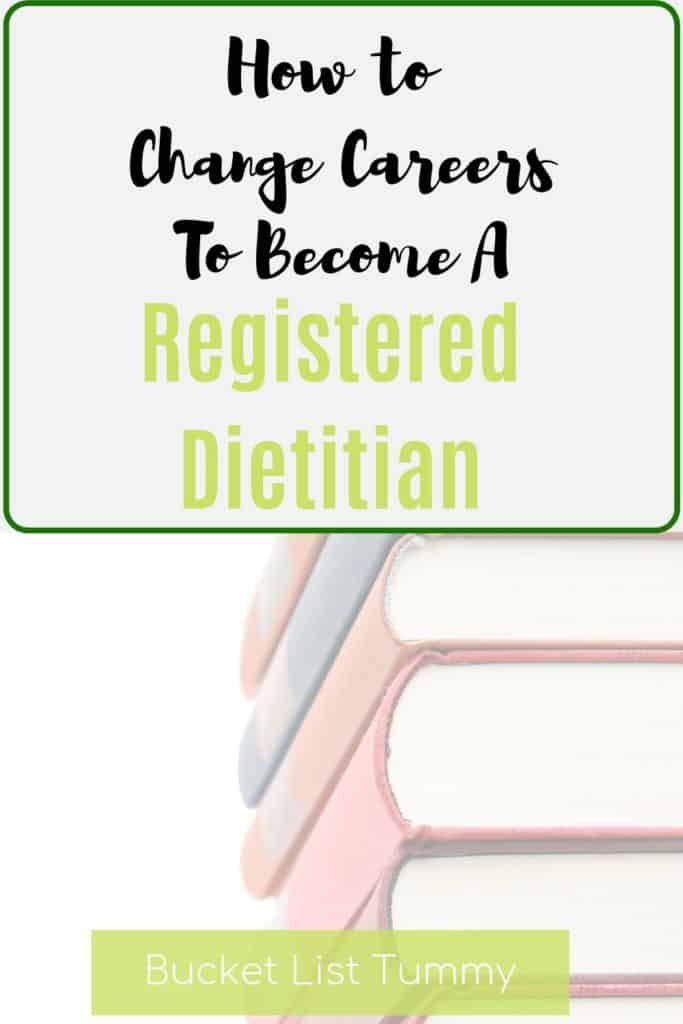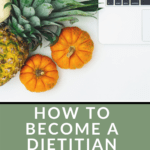How to Become a Registered Dietitian if you Already Have a Degree
- February 3, 2020
- Last Updated: December 30, 2024
- 22 Comments
- Nutrition
“How to become a dietitian” is a common question, but you may feel left out if you’re a career changer, like I was. So, I’ll tell you how to become a Registered Dietitian if you already have a degree, and what you can do to minimize prereqs.
As an Amazon Affiliate, I may earn from qualifying purchases.
How do you become a Registered Dietitian if you already have a degree? How do you switch careers and become a dietitian? Is becoming a dietitian worth it? What do you have to do to become a dietitian?
Many of you have questions about the process of becoming a dietitian, especially without a bachelor’s degree in nutrition, which was my case as well.
I figured it was time to write a summary post on for you on how to become a dietitian and share how I did it.
How To Become a Registered Dietitian
I think it’s becoming more and more “normal” to change careers and go back to school for something different than you studied in undergrad.
At least for me, that is exactly what I did and what led me to becoming a dietitian.
I have met so many other career change dietitians and I’m thankful for the path I’ve taken in learning about careers in food and nutrition. It also led me to the career and dream job I have right now.

So, let’s talk a little bit about how I took a long-winded path to become a dietitian and study nutrition.
So, if you are considering it, you can learn how to do it too.
How long does it take to become a Registered Dietitian? The answer may vary slightly depending on your academic background, the time you have available for commitment and the school/program you’re looking at.

How to Become Registered Dietitian If You Already Have a Degree
I originally went to college thinking I wanted to major in physical therapy or athletic training. At that point, becoming a dietitian wasn’t even on my radar.
So, I initially declared that as my major and started taking science courses, like anatomy & physiology, biology, chemistry and physics.
While I did really well and found nutrition interesting, it didn’t resonate with me as something to actually study or have a career in.
I eventually switched to Sport Management and earned my undergraduate degree in that.
Years later, I decided I was really into nutrition and researched how to become a dietitian online.
How Hard Is It To Become a Registered Dietitian? (What Do You Have To Do To Become a Dietitian?)
These steps are specifically for those who want to change careers to become a dietitian. It can be time-consuming.
1. Take Prerequisites for a Nutrition Degree
First, if you have a degree in anything other than nutrition, you have to take prerequisites, which vary by school. This makes things tricky.
I would recommend looking at which schools you want to apply to BEFORE taking prereqs, and try to take as many common ones as possible!

Eat Right Pro does a great job of breaking down which schools you are eligible for and what prereqs may be necessary. It does vary slightly from program to program.
The prereqs don’t really matter whether you’re looking for clinical jobs or public health nutrition jobs (if you even know that, initially).
The common courses to become a dietitian are:
- general chemistry (with a lab)
- organic chemistry (with a lab)
- biology (with a lab)
- anatomy and physiology
- microbiology (with a lab)
- biochemistry (some require multiple biochem courses)
- introduction to nutrition
There are also several online dietetics courses you can take and registered dietitian programs online for those who are working full-time.

2. Choose Your Graduate or Undergraduate Program
Lucky for me, some of my undergrad courses transferred, since I studied athletic training. I had one less organic chemistry to take, and my anatomy and physiology and biology also transferred.
I took organic chemistry and microbiology at a local school as my prereqs. I also took an introduction to nutrition course while working full time (at nights after work).
This confirmed my interest in health and nutrition.
I’ll never forget taking an online biochemistry course as my final prereq before starting a coordinated MPH program at UNC Chapel Hill.
The program I went through was a 2.5 year program, with 3 rounds of rotations (internships) included.
So, when I graduated, I graduated with a Master’s Degree in Public Health Nutrition, as well as a verification statement needed to take the RD Exam.

3. Complete a Verified Internship (1200 Hours)
Here are my Tips For Getting an Internship.
Fortunately, now, there are so many ways to do this virtually so you don’t have to move if your conditions don’t allow.
For example, if you
4. Study For the RD Exam
This is a huge topic in and of itself, so I’ve written an extensive blog post on my one month plan for studying for the RD Exam.
I don’t want to repeat everything here, but I will share my favorite resources for studying:
- Visual Veggies (Yes, this program is pricey, but in my opinion, it’s 110% worth it for the way it helps you study!)
- Krause textbook (this is the Bible)
- RD exam practice tests
- already made for you flashcards
I think it’s totally possible to study for the exam in less time (2 weeks) but I wouldn’t necessarily recommend it.
At least for me, taking time to study and let the information sink in (over days and weeks with multiple flashcards and Visual Veggies quizzes) works best.

How Long Does It Take to Become a Dietitian?
Depending on the course you chose (undergraduate, graduate school, career change), it will take 2-3 years to take the necessary courses and complete the internship.
Plus, factor in time for studying for the RD Exam.
I have a whole in depth post about how many years it takes to become a dietitian.
A Registered Dietitian is a Professional Who…
Fill in the blank! That’s a trick question because there are SO many opportunities in nutrition and dietetics now.
If you can dream it, you can make it happen.
Review of Requirements to Become a Dietitian
Let’s recap on how to become a Registered Dietitian.
In order to become a dietitian (career changer dietitian or not), you have to complete the necessary coursework (as mentioned above), earn a verification statement, complete a 1200 hour supervised internship program and study for and pass the RD exam.
Additionally, you will need to follow state requirements and maintain licensure if necessary. All registered dietitians need to earn 75 continuing education credits every 5 years.
Again, the steps required are:
- Complete a minimum of a bachelor’s degree at a US regionally accredited university or college and course work accredited by the Accreditation Council for Education in Nutrition and Dietetics (ACEND®) of the Academy of Nutrition and Dietetics. Here, you will take the DPD (Didactic Program) Coursework, which are the core classes that everyone takes.
- This website is super helpful in determining what schools offer distance programs and what prereqs are necessary for each program.
- Complete an ACEND®-accredited supervised internship at a health-care facility, community agency, or a foodservice corporation or combined with undergraduate or graduate studies. Typically, a practice program will run six to 12 months in length.
- Some programs include this internship as part of their program. They are called “Coordinated Programs.” I went to a coordinated program for grad school, so I received my MPH concurrently while doing my internship.
- If you don’t do a coordinated program, once you complete your DPD requirements, you will need to apply to an internship separately (All Access Internships will help you match (use code BUCKETLISTTUMMY for 20% off!). To do this, you will receive a verification statement indicating completion of the didactic program in dietetics components prior to applying to the dietetic internship match
- Pass a national examination administered by the Commission on Dietetic Registration (CDR). For more information regarding the examination, refer to CDR’s website at www.cdrnet.org.
- Complete Continuing Professional Educational Requirements (CEU’s) – You have to complete 75 every 5 years.
Is Being a Dietitian Worth it?
Is becoming a dietitian worth it? In my opinion, absolutely, because you can help people in so many different ways!
Had I not changed careers, taken prerequisites, and gone back to school, I would still probably be thinking about nutrition and learning about it.

But I wouldn’t have the necessary qualifications and expertise to practice it like I would now that I’m a dietitian.
If you’re business savvy, you can have your own business. If that’s not your cup of tea, you definitely don’t have to work for other people – leave the business stuff to them!
If you have little kids at home and want to work from home, there are several opportunities to do so, like what I have created.
There are so many different registered dietitian jobs available now – you can even create your own!
If you can dream it, you can do it.

What Can You Do With a Nutrition Degree?
From working in a supermarket or hospital to owning your own private practice and everything in between, there are so many options.
You can even choose to specialize in a population you may love, such as children, older adults, eating disorders, cancer patients, kidney disease, diabetes, pregnancy and so much more.
You can blog, write and develop recipes, host a podcast, coach 1-1, do group coaching, work in a supermarket, work for a food brand, work in marketing, work in sales, work in events, freelance, etc.

Where Do Dietitians Work?
We no longer live in a world where dietitians are only allocated to clinical settings! There are registered dietitian jobs and opportunities galore.
I remember initially thinking, “where do dietitians work if they don’t work in a hospital?” The answer is…LOTS OF PLACES!
- Sports Dietitian (working with high school, collegiate, professional sports)
- Food Service or Food Service Management
- Clinical Dietitian (Working in a hospital, inpatient or outpatient)
- Working in public health (there are several public health nutrition jobs, like working at a health department, in WIC, developing programs for schools, organizations
- Research Dietitian
- Blogging (Blogging can be lucrative if you understand SEO!)
- Corporate Wellness
- Private Practice, Nutrition Counseling
- Social Media Management, Marketing & PR For Food Brands
- Grocery Store Dietitian
- Freelance Writing
- Recipe Development and Photography
- Public Speaking
- Working As a Professor, Teacher or in Education
- Working in Nursing Homes, Substance Abuse Centers

Other Resources
If you’re interested in learning more about blogging, monetization, email marketing and SEO (Search Engine Optimization), I HIGHLY recommend Erica Julson’s courses.
I’ve completed three and they are so helpful and worth every penny and more!
I also offer 1:1 mentoring services to dietitians with business questions, RD’s to be, or those looking to get into nutrition but feel overwhelmed about where to start.
Explore More Recipes
NutritionSupport Bucket List Tummy











Like This Content?
Support Bucket List TummyThe detailed steps you provided for becoming a registered dietitian are very helpful. It’s great to know that even with a different undergraduate degree, one can still pursue a career in nutrition. Thanks for the valuable information!
Regards,
Raquel Britzke
I’m glad you found it helpful, Raquel!
Thanks for such a detailed article. You are God sent 🙂 I am planning to change my career from technology, and your article was very helpful.
You have provided a website to determine what schools offer distance programs and what prereqs are necessary for each program. Unfortunately, the website is not working. Kindly let me know if you have the detailed saved somewhere else. Appreciate your blog again. Thank you!
I am doing diploma in clinal Nutrition and dietics how can i be registered?
Hii , I am a bhms graduate and carrying my internship now .
Your saying was just great.
It had helped me for thinking about my future .
This sounds all good. But where I am stuck is on the science requirements. Did you have to study a lot of math? how hard was it? I have a bachelor’s degree in cultural anthropology and it is has been a very long time since I have done any math. Also, do you know anyone studying a masters degree in their early forties?
Personally, my program did not have a ton of math requirements, but heavy science focused. I did take calculus in my undergrad. I think statistics is a prereq for most schools. And yes, I know plenty of people age 40 and above who have gone or are going back for their master’s. I think it’s worth it if it is what you want to spend your life doing!
You did mention in your blog that you can work in Education or as a Teacher. One can work as a health teacher?
Are you talking about a health teacher in a high school setting? You wouldn’t necessarily need a nutrition degree for that, though I’m sure it would be helpful. It you were teaching at a college course level, there would likely be more stringent qualificiations, and it’s probably encouraged to get the Registered Dietitian credential, and/or advanced degrees and education (ie Masters/PhD).
Hey, I am currently studying to become a RD, but my school is not an accredited dietetic school. I am taking the science prerequisites courses and getting my undergrad degree. Can I transfer my credits to get my master’s in dietetics?
(I thought one couldn’t transfer credits, but maybe it is only to get another bachelor’s degree)
🙂
I think it is dependent on the school! For example, my undergraduate science prerequisites did transfer over since they were within an allotted time frame. I would call admissions and ask.
Excellent post, Sarah. I am so happy for you finding out what you truly love to do…and respect you for the determination and dedication it took for you to accomplish this!
This was so interesting. I wish I had known more about nutrition/RD during college. It seems like something I would’ve loved to study!
It’s never too late if you do decide to change your mind! 😉
This was so interesting to read! I wish I had known more about RD and nutrition while in school since I feel like it would be right up my alley.